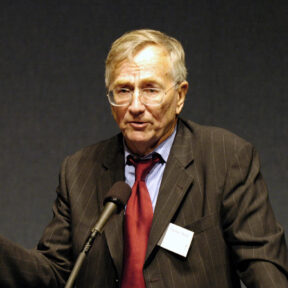
Seymour Hersh
: Photo from Wikimedia Commons / Author of Photo: Institute for Policy StudiesOverview
* Investigative reporter for The New Yorker Magazine
* Won Pulitzer Prize for My Lai Massacre reporting during Vietnam War
* First published his My Lai story in leftwing Dispatch News Service
* In 1968 worked as Press Secretary for anti-Vietnam War Democratic presidential candidate Senator Eugene McCarthy
* Nicknamed “my little commie” by Executive Editor of _The New York Times_ when he worked there
* Protégé and friend of radical journalist I.F. Stone
* Typically bases his reporting, which tends to be highly critical of the United States, on unnamed sources that are difficult for others to verify
Born in Chicago in 1937, Seymour Myron “Sy” Hersh is an investigative journalist who won a Pulitzer Prize in 1970 for his reporting about what came to be called the “My Lai Massacre” at a village in Vietnam.
Since the terrorist attacks in America on September 11, 2001, Hersh has written exclusively for The New Yorker magazine.
In May 2004 Hersh again made news with an investigation of “how the Department of Defense mishandled the disaster at Abu Ghraib,” a prison in Iraq where inmates were treated and photographed in degrading ways in what Hersh described as “part of the dehumanizing interrogation process.”
This article, like much of his writing over three and a half decades, featured Hersh’s favorite villains – wrong-doing American soldiers, wicked American leaders and evil agents of the U.S. Central Intelligence Agency, the CIA.
Hersh and his fraternal twin Alan were born in Chicago, Illinois on April 8, 1937. “His parents, who emigrated to the U.S. from Lithuania and Poland, spoke Yiddish and ran a dry-cleaning shop in a tough section of the city’s South Side,” wrote Scott Sherman in the Columbia Journalism Review (CJR). “Hersh, however, was raised in a more genteel section near Hyde Park.” Hersh described his parents to David Rubien of Salon.com as middle-class and apolitical. Seymour and Alan had two older sisters, also twins.
By 1955 Hersh had already experimented with marijuana, read J.D. Salinger and watched controversial comedian Lenny Bruce at a Chicago club. A poor student, Hersh in 1958 eked out a bachelor’s degree in History from the University of Chicago. While there he met his future wife Elizabeth Sarah Klein, with whom he would have three children.
Trying to find his way in life, Hersh “was admitted to the University of Chicago Law School,” wrote Sherman, “but was expelled for poor grades.” He worked at Walgreens drug store for $1.50 an hour, but then took a $35 per week job reporting on crime for Chicago’s City News Bureau. After a brief stint in the Army at Fort Riley, Kansas, he in 1961 founded a short-lived suburban Chicago newspaper.
In 1962 Hersh was hired by the wire service United Press International (UPI), which assigned him to cover the legislature and other news from South Dakota. A year later he left UPI to report for Associated Press (AP), which in 1965 moved him to Washington, D.C. Befriended by muckraking Leftist journalist I.F. Stone, Hersh soon learned to approach middle and upper level government people directly to ferret out information concealed by government press briefers.
In 1967 AP assigned this hard-digging young reporter to its special investigative unit. But after a story he wrote about the Pentagon development of chemical and biological weapons was heavily edited by his bosses, Hersh quit AP and sold his story to the liberal magazine The New Republic.
At the urging of Left-leaning columnist Mary McGrory, Hersh in 1968 took the job of Press Secretary for the renegade anti-Vietnam War presidential campaign of Senator Eugene McCarthy (D.-Minnesota). After three months Hersh quit, disillusioned with political gameplaying.
On a tip from a Village Voice columnist, freelance journalist Sy Hersh in 1969 began tracking down the story of a purported massacre of civilians a year earlier in the South Vietnamese village My Lai. Hersh, with a small grant from The Fund for Investigative Journalism, located and for hours interviewed the officer accused of what happened at My Lai, Lt. William Calley, Jr., and others.
After Hersh’s investigation was released by David Obst’s small Left-wing Dispatch News Service and got published in 36 newspapers, it snowballed into major news and led to Hersh winning the 1970 Pulitzer Prize for international reporting, a prestigious George Polk Award and other honors. Hersh’s book about My Lai was published in 1970 to critical acclaim but less-than-stellar sales. He was nevertheless a new star in the journalistic heavens.
In 1972 The New York Times hired Hersh as its investigative superstar to compete with Bob Woodward’s and Carl Bernstein’s “Watergate” reporting at the Washington Post. Starting far behind them, Hersh did well in covering this and other hot stories, but then as now he envied Woodward’s fame, portrayal by Robert Redford in the movie “All the President’s Men,” and high income.
The passion that drives Hersh has often manifested as genuine hatred for American leaders, the projection of American power, and the Central Intelligence Agency (CIA).
Hersh’s Blame-America-First choice of targets for his hatred prompted the then-Executive Editor of the New York Times A.M. Rosenthal to refer routinely to Hersh as “my little commie.” Among the targets of Hersh’s reporting in both The Times and his books were the overthrow of Chile’s Marxist President Salvadore Allende, according to Hersh with CIA contrivance, and what Hersh saw as the evil of President Richard M. Nixon’s National Security Advisor and Secretary of State Henry Kissinger.
In 1997 Hersh shocked conventional liberals with a book exposing the clay feet of their icon and martyr President John F. Kennedy. In The Dark Side of Camelot (Little, Brown) Hersh delved into JFK’s extramarital relationships and his other shortcomings.